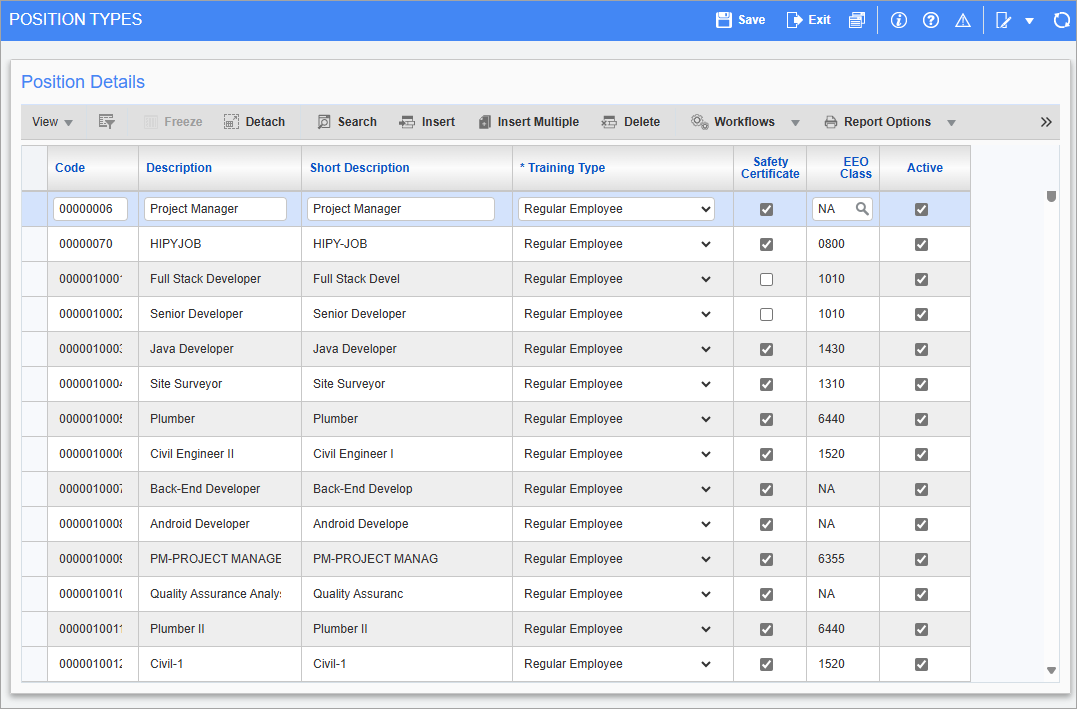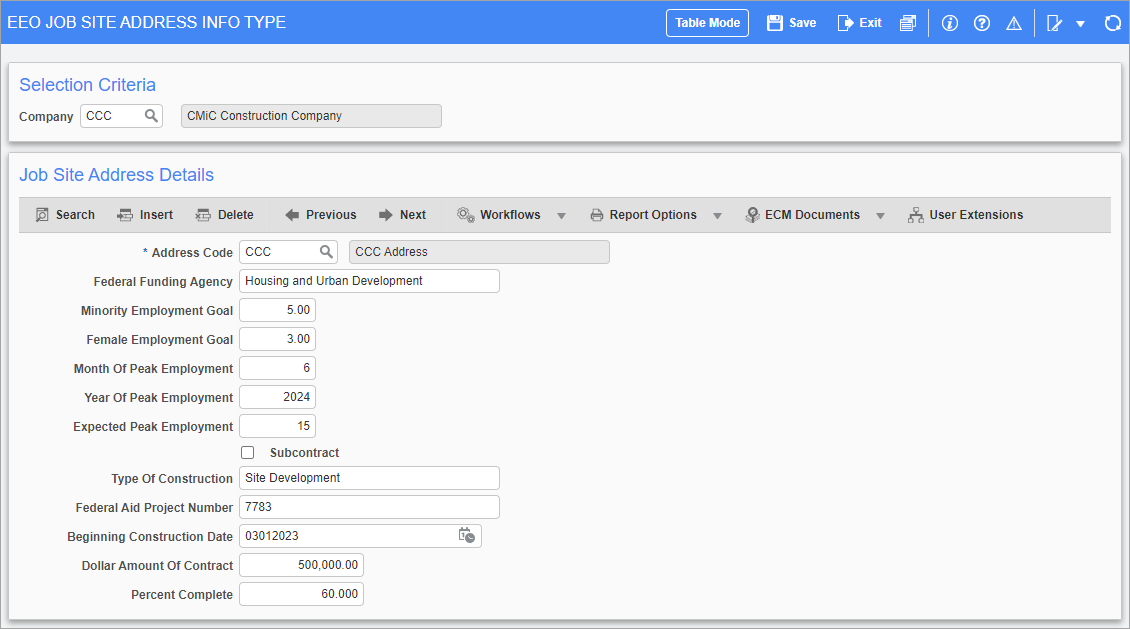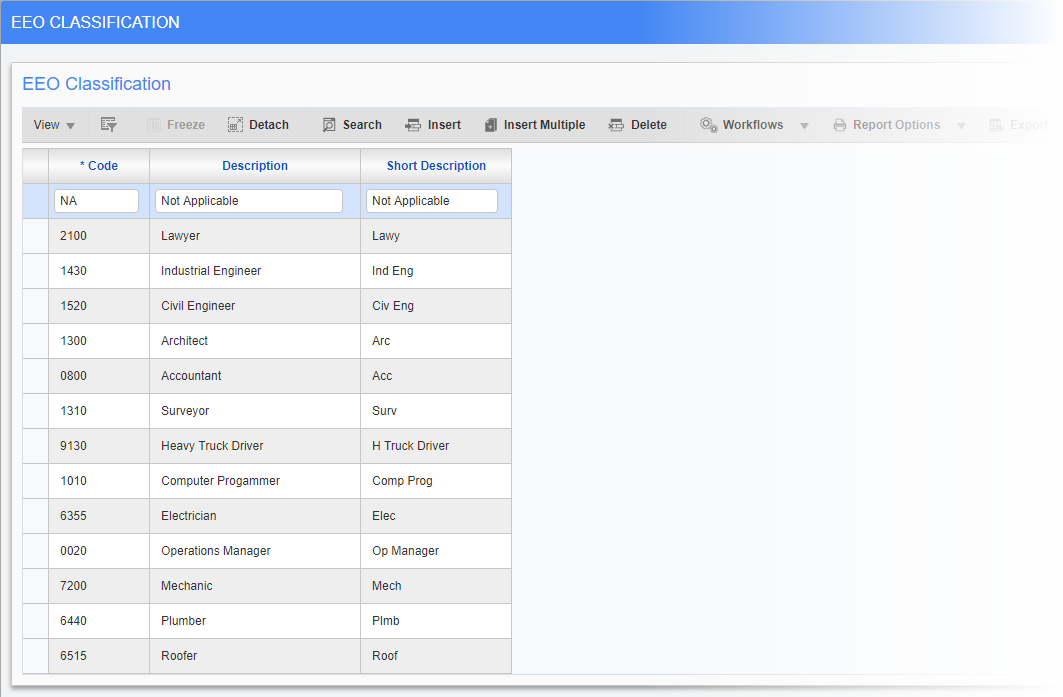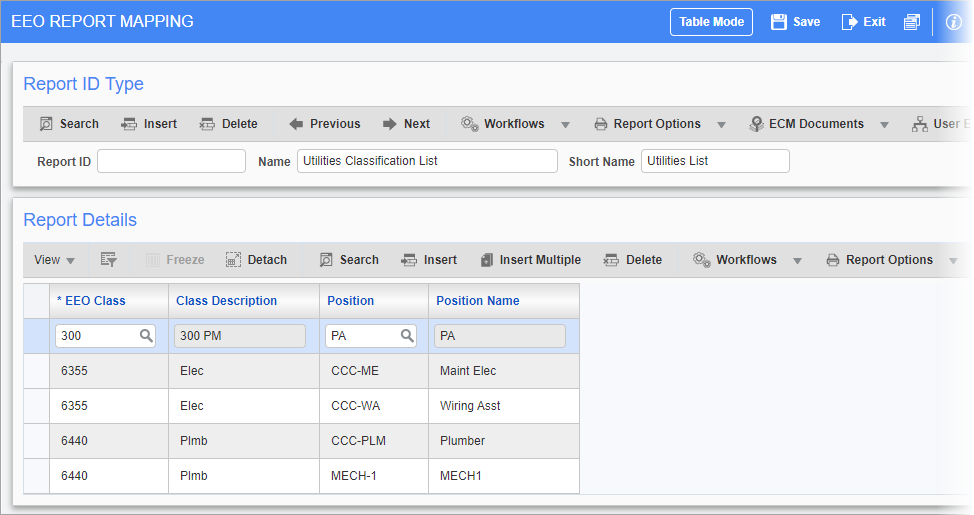This sub-menu allows for the maintenance of positions and trades as well as information related to EEO classifications and reporting.
Position Types

Pgm: HRPOSITN – Position Types; standard Treeview path: Human Resources > Setup > Local Tables > EEO Positions > Positions
The Position Types screen allows the definition of company positions, although the definitions need not be company-specific. While the codes and descriptions are specified by company HR policies, each position must be related to an Equal Employment Opportunity (EEO) class for reporting purposes. If the Payroll modules are used in conjunction with Human Resources, the position codes that appear here are the trade codes defined in Payroll.
Code
Enter the code for the position.
Description, Short Description
Enter the full and short descriptions for the position.
Training Type
Select whether a regular employee, apprentice, or student occupies the position. This distinction is necessary for some EEO reports, such as the EEO 257.
Safety Certificate – Checkbox
Check this box if occupants of this position are eligible to receive safety awards and certification.
EEO Class
Enter/select the EEO class for the position. This can either be done here or in the Map Positions to EEO Classifications screen found later in this sub-menu. EEO classes can be defined in the EEO Classifications screen, which is shared with the US Payroll module.
Active – Checkbox
Check this box to make the selected position available in the following LOVs:
-
The Position List launched from the Job Title field on the Personal tab of the Employee Profile screen, which is shared with the US Payroll module.
-
The Job Classification List launched from the Job Classification field on the HCM tab of the Employee Profile screen, which is shared with the US Payroll module.
EEO Job Site Address Information Type

Pgm: HREEOJOB –EEO Job Site Address Info Type; standard Treeview path: Human Resources > Setup > Local Tables > EEO Positions > EEO Job Site Address Information
This screen allows for the entry of information associated with EEO-type jobs which can be used in the headings of the EEO reports.
Address Code
Enter/select the address code for the job. These codes can be set-up in the Address Code screen (standard Treeview path: System > Global Tables > Address Code). The same address code can be entered in the HR Info tab in the Employee Profile, thus linking employees to EEO information.
Federal Funding Agency
Enter the federal agency providing funding for the job.
Minority Employment Goal, Female Employment Goal
Enter the desired number of minority and female employees to be hired.
Month of Peak Employment, Year of Peak Employment
Enter the month and year during which the number of employees on the job was at a maximum.
Expected Peak Employment
Enter the expected maximum number of employees working on the job.
Subcontract – Checkbox
Check this box if another company is subcontracting the job.
Type of Construction
Enter the type of construction the job is concerned with.
Federal Aid Project Number
Enter the federal aid project number here. This field should only be filled if the Federal Funding Agency field has been filled as well.
Beginning Construction Date
Enter/select the date on which construction for the job began.
Dollar Amount of Contract
Enter the monetary amount (in USD) that appears on the job contract.
Percent Complete
Enter the percentage amount of the job that has been completed.
EEO Classification

Pgm: PYEEOCLS – EEO Classification; standard Treeview path: Human Resources > Setup > Local Tables > EEO Positions > EEO Classifications
This screen is used to enter EEO classification codes, as defined by the US government. EEO codes refer to the general type of work being performed and are a US requirement for employees paid on government jobs.
This screen is shared with the US Payroll module (standard Treeview path: US Payroll > Setup > Local Tables > EEO Classifications).
NOTE: If the system is being run outside of the US or does not use EEO class codes, please set-up one generic code (“NA”, for example) to be used in the Trades Maintenance screen.
Code
Enter a unique EEO Classification Code.
Description, Short Description
Enter the full and short job descriptions for the EEO code.
EEO Report Mapping

Pgm: HRPOGRPT – EEO Report Mapping; standard Treeview path: Human Resources > Setup > Local Tables > EEO Positions > Map Positions to EEO Classifications
This screen is used to group employee occupations for EEO reporting purposes. The occupational groups created in this screen can be viewed in the EEO Classification Assignment Listing screen (standard Treeview path: Human Resources > Reports > EEO Reports > EEO Classification Assignment Listing).
Report ID
Report ID, Name, Short Name
Enter the ID number, and full and short names for this group.
For each report ID this screen creates a separate mapping of positions to EEO classifications. For any report ID each position may appear once at most. However, multiple positions may be mapped to the same EEO classification.
Occupational Groups
EEO Class
Enter/select the EEO class code being mapped. The shortened name of the class appears in the Class Description field.
Position
Enter/select the position code to be mapped to the EEO class. The name of the position appears in the Position Name field.